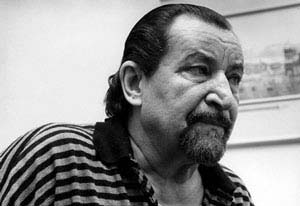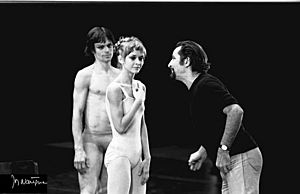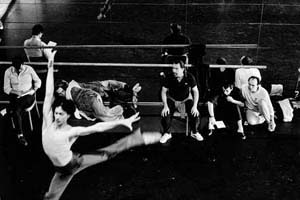Maurice Béjart facts for kids
Quick facts for kids
Maurice Béjart
|
|
|---|---|

Béjart in 1988
|
|
| Born |
Maurice-Jean Berger
1 January 1927 Marseille, France
|
| Died | 22 November 2007 (aged 80) Lausanne, Switzerland
|
| Occupation | Dancer, choreographer and opera director |
Maurice Béjart (born January 1, 1927, died November 22, 2007) was a famous dancer and choreographer from France. A choreographer is someone who creates dance routines. He also directed operas. He led the well-known Béjart Ballet Lausanne dance company in Switzerland. After he passed away, he was given Swiss citizenship.
Contents
About Maurice Béjart
Maurice-Jean Berger was born in Marseille, France, in 1927. His father was a philosopher named Gaston Berger. Maurice became very interested in dance after seeing a performance by Serge Lifar. He then decided to dedicate his life to dancing. When he was in Southern France, he studied dance with Mathilde Kschessinska.
In 1945, he joined the ballet group at the Opéra de Marseille. From 1946, he continued his dance studies in Paris. He learned from famous teachers like Madam Rousanne, Léo Staats, Madam Lyubov Yegorova, and Olga Preobrajenska at "Studio Wacker."
In 1948, he also trained with Janine Charrat and Yvette Chauviré. Later, he worked with Roland Petit. He also studied with Vera Volkova in London.
Founding Dance Companies
In 1954, Maurice Béjart started his first dance company called the Ballet de l'Étoile. This company closed in 1957. In 1960, he founded the Ballet du XXe Siècle (Ballet of the 20th Century) in Brussels, Belgium. This company became very famous.
In 1987, he moved to Lausanne in Switzerland. There, he started a new company called the Béjart Ballet Lausanne. This company is still one of the most well-known and successful dance groups in the world.
Notable Performances and Works
In 1973, with his Ballet du XXe Siècle, Béjart presented "Golestan." This ballet was based on a poem by Sa'di and used traditional Iranian music. It was first performed at the Shiraz-Persepolis Festival of Arts. Another work, "Improvisation sur Mallarme III," also premiered at that festival in 1973.
"Farah," another ballet using Iranian traditional music, was first shown in Brussels in 1976. It was also performed at the Shiraz-Persepolis Festival that same year. The 1976 festival also featured the first performance of "Heliogabalus." Béjart had strong connections with Farah Pahlavi, the former Empress of Iran, who supported the festival.
One of his most famous works is a new version of The Nutcracker, which he created in 2000. He used Tchaikovsky's original music. However, he completely changed the story and characters. His version tells a new story about a boy trying to reconnect with his mother.
Dance Schools
Maurice Béjart also founded several important dance schools. These schools helped train many professional dancers.
- The Mudra School in Brussels, Belgium, from 1970 to 1988.
- The Mudra Afrique School in Dakar, Senegal, from 1977 to 1985.
- The Rudra School in Lausanne, Switzerland, from 1992 to 2007.
The Rudra School is still open today. It is known as one of the most famous professional dance schools in the world. In 1996, Béjart also led a workshop for professional dancers in Italy.
Awards and Honors
Maurice Béjart received many awards and honors during his life. These awards recognized his great contributions to the arts.
- He received the Japanese Order of the Rising Sun.
- He received the Belgian Ordre de la Couronne.
- In 1974, he won the Erasmus Prize.
- In 1994, he became a member of the Académie des Beaux Arts, a famous French academy for the arts.
- In 2003, he was given the title of Commandeur des Arts et des Lettres.
- In 2003, he won the Prix Benois de la Danse for his lifetime achievements in dance.
See also
 In Spanish: Maurice Béjart para niños
In Spanish: Maurice Béjart para niños
 | John T. Biggers |
 | Thomas Blackshear |
 | Mark Bradford |
 | Beverly Buchanan |



